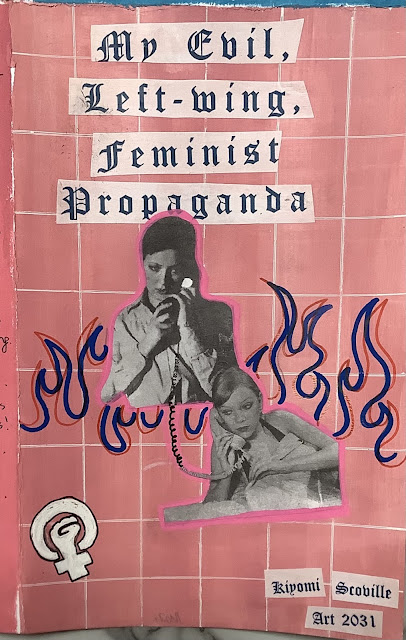
Look At Me
Kiyomi Scoville
20"x24" acrylic and gouache on canvas
For my project I chose Tabaimo, a Japanese artist whose "drawings and video installations probe the unsettling themes of isolation, contagion, and instability that seem to lurk beneath daily existence in contemporary Japan."(art21.org). Many of her works are installation pieces whereby she uses animated illustrations in spaces that you can walk in, as a way of immersing the viewer in the intimate scenes that she also often places in very public spaces such as trains, bathhouses, and restrooms. Her characters are often displaced in their environment either through "mutation or as victims of inexplicable violence"(art21.org).
My response to this was somewhat personal; being of Japanese heritage myself, my grandmother is Issei or second generation Japanese Canadian and she often tells me what it was like growing up in a traditional Japanese household while at the same time having the majority of her childhood spent during the times of forced relocation and internment camps after WW2. One issue that always held my attention and kept me up at night, was the casualty in her voice when talking to me about the domestic abuse and strict patriarchies that often occurred in the Japanese households she was familiar with. At the age of ten, when my family visited us from Japan, I learnt what domestic abuse was. I was horrified that somehow marriage, this union that I had always been taught was beautiful and magic, could somehow result in so much pain and violence. At the age of ten I remember watching my relatives leave and worrying deeply if one of them would be safe when they got back. Its been ten years later and I still think about her and wonder what happened and if there was anything I could have done even as a child.
I wanted to use this project and this artist to create a painting that expressed how I feel about the issue. I felt like this issue was presented to me for only a moment in my childhood, and yet that moment has stuck with me. I imagined this through a subway's doors being open in my painting, normally only open for a few moments and yet they will always be open in my painting. Furthermore; the setting was inspired by Tabaimo's use of intimate individuals placed in public spaces. I also used what we've learnt in class to create a directed perspective with the walls and floor which was a further response to Tabaimbo's use of interior spaces in her works. The sign above her head in Japanese translates to the title of my piece Look at me, because when I was younger it felt as though I was the only one hearing about the abuse happening even though everyone around me also knew, I felt like yelling at them to do something about it, or care more, and ten years later I suppose this is my way of doing so.
Example of Tabaimo's work: Japanese Bathhouse (Tabaimo 2005)
